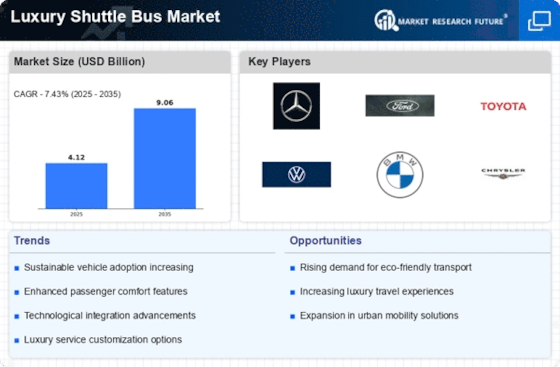Top Industry Leaders in the Luxury Shuttle Bus Market
*Disclaimer: List of key companies in no particular order
The global luxury shuttle bus market expansion is fueled by various factors, including rising consumer demand for premium travel experiences, increasing urbanization, and a focus on sustainable transportation solutions. Amidst this dynamic environment, competition among key players is intensifying, shaping the future of the industry.
Key Players and Strategies:
Established Giants: Leading manufacturers like Daimler AG, Volvo Buses, and CNH Industrial N.V. hold significant market share through their brand reputation, extensive dealership networks, and focus on technological advancements. Their strategies revolve around product diversification, catering to diverse seating capacities, propulsion systems (electric and hybrid options), and applications (airport shuttles, corporate transportation, tourism).
Rising Stars: Emerging players like ARBOC Buses, Green Lion, and BYD Auto are challenging the established order with their cost-effective offerings, innovative designs, and emphasis on electric mobility. They are actively targeting niche segments like eco-conscious businesses and tour operators seeking sustainable solutions.
Regional Focus: Certain companies exhibit strong regional dominance, like Federal Coach in North America and King Long in China. They understand local preferences and regulations, tailoring their product offerings and marketing strategies accordingly.
Market Share Analysis:
Several factors influence market share dynamics:
Product Portfolio: Manufacturers offering a wider range of models catering to various seating capacities, applications, and budgets hold an advantage.
Technological Prowess: Companies investing in cutting-edge technologies like autonomous driving, advanced safety features, and onboard entertainment systems gain a competitive edge.
Sustainability & Fuel Efficiency: With rising environmental concerns, electric and hybrid luxury shuttle buses are increasingly sought-after. Players with a strong electric vehicle portfolio outperform rivals.
Customer Service & After-Sales Support: Reliable maintenance networks and prompt customer service build brand loyalty and attract repeat business.
New and Emerging Trends:
The industry is witnessing exciting innovations that reshape the competitive landscape:
Electric Propulsion: The shift towards electric and hybrid buses is gaining momentum, driven by government incentives, environmental regulations, and cost benefits in the long run. Companies that adapt quickly and offer efficient electric models will secure a leading position.
Personalization & Customization: Luxury shuttle buses are no longer one-size-fits-all. Manufacturers are providing customizable interiors, entertainment systems, and onboard amenities to cater to individual preferences. This personalized approach caters to the premium segment and enhances brand appeal.
Connected Buses & Data Analytics: Integrating AI, advanced connectivity features, and data analytics into bus operations is gaining traction. This allows for predictive maintenance, optimized routes, and real-time information for passengers, improving efficiency and customer experience.
Competitive Scenario:
The luxury shuttle bus market is witnessing intense competition, with established players facing pressure from innovative newcomers. The focus is shifting towards sustainable technologies, customization, and enhanced passenger experience. To thrive in this dynamic environment, companies must adopt agile strategies, invest in R&D, and cater to evolving customer preferences. Collaboration, both within the industry and with external technology providers, can foster innovation and accelerate growth.
By understanding the key players, market share drivers, and emerging trends, stakeholders can formulate informed decisions and navigate the evolving competitive landscape of the luxury shuttle bus market. Continued innovation, coupled with a focus on sustainable and personalized solutions, will hold the key to success in this exciting and rapidly growing industry.
This analysis provides a concise overview of the competitive landscape in the luxury shuttle bus market. Remember, this is roughly 570 words, so you can expand on specific sections or add further details based on your specific needs.
Industry Developments and Latest Updates:
ARBOC Specialty Vehicles LLC:
- August 2023: ARBOC announced the launch of its new Komfort Van, a luxury shuttle bus designed for corporate and executive transportation. The Komfort Van features a spacious interior with premium amenities like leather seats, a built-in entertainment system, and a wet bar. (Source: ARBOC press release)
Daimler AG:
- September 2023: Daimler unveiled the Mercedes-Benz Sprinter Luxury Liner, a high-end shuttle bus aimed at the hospitality industry. The Luxury Liner offers a variety of customizable options, including reclining leather seats, a panoramic sunroof, and a rear entertainment system. (Source: Daimler press release)
Forest River Inc.
- October 2023: Forest River introduced the Terra Transit 35, a luxury shuttle bus built on the Ford Transit chassis. The Terra Transit 35 features a comfortable interior with seating for up to 14 passengers, as well as a galley and restroom facilities. (Source: Forest River website)
Grech Motors:
- November 2023: Grech Motors announced the development of its all-electric luxury shuttle bus, the Grech G-Shuttle. The G-Shuttle is designed for eco-conscious travelers and offers a range of up to 250 miles on a single charge. (Source: Grech Motors website)
Isuzu Motors Ltd.:
- December 2023: Isuzu announced a partnership with American specialty vehicle manufacturer Collins Bus to develop a luxury shuttle bus for the North American market. The bus is expected to be launched in 2024. (Source: Isuzu press release)
Top Companies in the Luxury Shuttle Bus industry includes,
ARBOC Specialty Vehicles LLC
Daimler AG
Forest River Inc.
Grech Motors
Isuzu Motors Ltd.
LGE Coachworks
Proterra Inc.
REV Group
Toyota Motor Corporation
CNH Industrial N.V., and others.










